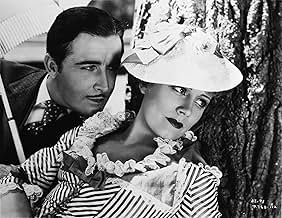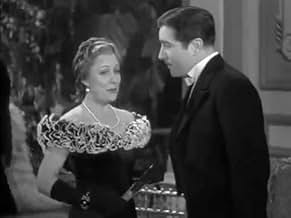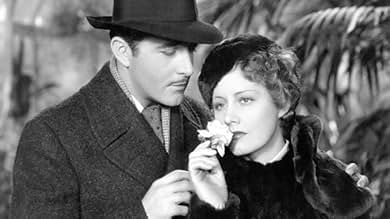An engaged attorney and a divorcee fall for each other in 1870s Manhattan.An engaged attorney and a divorcee fall for each other in 1870s Manhattan.An engaged attorney and a divorcee fall for each other in 1870s Manhattan.
- Awards
- 3 wins total
Barry O'Moore
- Mr. Welland
- (as Herbert Yost)
Lowden Adams
- Jenkins
- (uncredited)
Muriel Barr
- Miss Allison - Jenkins' Daughter
- (uncredited)
Harry Beresford
- Museum Guard
- (uncredited)
Lynn Browning
- Miss Archer
- (uncredited)
Herbert Bunston
- W.J. Letterblair
- (uncredited)
Bess Flowers
- Child's Mother
- (uncredited)
Alf James
- Man Who Comes with Chairs
- (uncredited)
John Merton
- John
- (uncredited)
Featured reviews
A lawyer attempting to obtain a divorce for a countess finds his growing love resisted by THE AGE OF INNOCENCE in which they lived.
Edith Wharton's celebrated novel, illustrating how personal happiness is often crushed by public propriety, is given a fine adaptation in this well-produced film from Radio Pictures. While the movie relentlessly features almost nothing but dialogue, it is always sophisticated and deals with matters still of some importance.
In a movie with so much talk the performances are paramount and they are all of a high order. Lovely Irene Dunne is radiant as the American countess restricted by society from following her heart. John Boles is very effective as the lawyer who must also either bow to convention or be crushed by it. Feisty Helen Westley steals nearly every scene she's in as Dunne's wealthy and outspoken Granny. Laura Hope Crews is perfectly cast as Westley's slightly flustered daughter, the mother of Boles' pretty fiancée, Julie Haydon. Herbert Yost is Crews' meek little husband, while splendid Lionel Atwill enjoys himself as a rich rascal operating on society's fringe.
Movie mavens will recognize Harry Beresford as a canny museum guard and Inez Palange as a stubborn Italian maid, both uncredited.
The jazzy montage which opens the film has virtually no relationship to anything that follows and serves only to wake the audience up.
Edith Wharton's celebrated novel, illustrating how personal happiness is often crushed by public propriety, is given a fine adaptation in this well-produced film from Radio Pictures. While the movie relentlessly features almost nothing but dialogue, it is always sophisticated and deals with matters still of some importance.
In a movie with so much talk the performances are paramount and they are all of a high order. Lovely Irene Dunne is radiant as the American countess restricted by society from following her heart. John Boles is very effective as the lawyer who must also either bow to convention or be crushed by it. Feisty Helen Westley steals nearly every scene she's in as Dunne's wealthy and outspoken Granny. Laura Hope Crews is perfectly cast as Westley's slightly flustered daughter, the mother of Boles' pretty fiancée, Julie Haydon. Herbert Yost is Crews' meek little husband, while splendid Lionel Atwill enjoys himself as a rich rascal operating on society's fringe.
Movie mavens will recognize Harry Beresford as a canny museum guard and Inez Palange as a stubborn Italian maid, both uncredited.
The jazzy montage which opens the film has virtually no relationship to anything that follows and serves only to wake the audience up.
Technically speaking, this is a generally well made film. The acting (apart from some serious over-melodramatic acting from John Boles) was good and the entire production looked marvelous. So why, then, only a score of 5? Well, the story seems to try hard to make an excellent point--only to have it undone by plot holes that just don't make a lot of sense. Perhaps in the original Edith Wharton novel this is not the case, but here the film seems to be missing something.
The film begins with Boles ("Newland Archer") becoming engaged with his long time sweetheart, May. They seem like a happy couple and they are going into the upcoming marriage with not a care in the world other than wanting to marry sooner than later. At about the same time, May's cousin (Countess Ellen Olenska--played by Irene Dunne) is arriving from Europe and there is a great scandal because Mrs. Olenska is planning on divorcing her husband--something that polite society at the time would NEVER condone. It is interesting that we never see her husband nor do we really know much about their marriage other than the fact that she is unhappy and wants out--even though her family is strongly in favor of her remaining married. The family's wishes, oddly, are NOT because of a love for Olenska but because they were more concerned about how the scandal would ruin their good name! Many, in fact, were totally unconcerned about her soon to be ex-husband nor about adultery--just what others would think. This hypocrisy made for an excellent theme and I wish the film had really worked more on this angle.
Unfortunately, out of the blue, Archer suddenly announces to the Countess that he loves her!! Where this comes from makes no sense at all--especially since his bride to be is a sweet lady who has done no one wrong. Yet despite this profession, Archer still marries May and they go on their honeymoon. During this time, Archer is distant and quite frankly a major jerk--pining for the Countess and ignoring his poor wife. Frankly, any sympathy you had for the Countess and her divorce is quickly lost because she, too, is conspiring with Archer to run away together. So instead of an excellent story of hypocrisy, the story becomes a story of lust and selfishness--making the viewer really hate Boles and Dunne (especially Boles). All the great buildup of the last hour of the film is practically thrown away when this affair appears out of nowhere.
So what, at this point, is the point of the film? This ambiguity was a serious deficiency with the film. Had Archer never married May and then run off with the Countess, then you might have had a lot of sympathy for the couple. As is, they just seemed nasty and selfish. And the overall message seemed muddled. Were they trying to excuse away adultery or somehow trying to be pro-marriage? I really don't know. Had Archer acted rationally and consistently and less like a weasel, then this message would have been much more clear. As a result, it seriously deadens the impact of this film. It COULD have been much, much better.
The film begins with Boles ("Newland Archer") becoming engaged with his long time sweetheart, May. They seem like a happy couple and they are going into the upcoming marriage with not a care in the world other than wanting to marry sooner than later. At about the same time, May's cousin (Countess Ellen Olenska--played by Irene Dunne) is arriving from Europe and there is a great scandal because Mrs. Olenska is planning on divorcing her husband--something that polite society at the time would NEVER condone. It is interesting that we never see her husband nor do we really know much about their marriage other than the fact that she is unhappy and wants out--even though her family is strongly in favor of her remaining married. The family's wishes, oddly, are NOT because of a love for Olenska but because they were more concerned about how the scandal would ruin their good name! Many, in fact, were totally unconcerned about her soon to be ex-husband nor about adultery--just what others would think. This hypocrisy made for an excellent theme and I wish the film had really worked more on this angle.
Unfortunately, out of the blue, Archer suddenly announces to the Countess that he loves her!! Where this comes from makes no sense at all--especially since his bride to be is a sweet lady who has done no one wrong. Yet despite this profession, Archer still marries May and they go on their honeymoon. During this time, Archer is distant and quite frankly a major jerk--pining for the Countess and ignoring his poor wife. Frankly, any sympathy you had for the Countess and her divorce is quickly lost because she, too, is conspiring with Archer to run away together. So instead of an excellent story of hypocrisy, the story becomes a story of lust and selfishness--making the viewer really hate Boles and Dunne (especially Boles). All the great buildup of the last hour of the film is practically thrown away when this affair appears out of nowhere.
So what, at this point, is the point of the film? This ambiguity was a serious deficiency with the film. Had Archer never married May and then run off with the Countess, then you might have had a lot of sympathy for the couple. As is, they just seemed nasty and selfish. And the overall message seemed muddled. Were they trying to excuse away adultery or somehow trying to be pro-marriage? I really don't know. Had Archer acted rationally and consistently and less like a weasel, then this message would have been much more clear. As a result, it seriously deadens the impact of this film. It COULD have been much, much better.
Of grand and velvety anachronism, The Age of Innocence is an orchestrated tale of romantic longing. A polished and elegant, if incomplete, period romance about the "innocent" wife of a wealthy New Yorker in love with another woman who, never going beyond flirtation, envelops him in layers of Victorian repression and traps him between the emotions of love- passion and bourgeois social ethics. This is a story set in the stifling atmosphere of upper-class turn of the 19th century New York. This is a rather interesting plot, though not as successful as a love story than as a social commentary. It was enjoyable to discover the vastly different generations that preceded us.
THE AGE OF INNOCENCE (RKO 1934) (81 minutes)
There have been three film versions of Edith Wharton's most renowned novel, The Age of Innocence. The 1924 silent version is lost. We are left with Martin Scorcese's definitive 1993 version in wide screen and color, derived from the novel itself with its multitude of characters and subplots, and this charming early talkie, based on a play version of the book.
Although the plot and narrative have been pared down considerably, the meat of the matter is still here and it is given first class treatment. Irene Dunne is radiant (when was she not?) in the role of the expatriate family member, Ellen, married into European royalty, and returned to 1870s New York Society, and John Boles gives a solid reading of the tortured Newland, a young lawyer betrothed to marry May Mingott, an innocent ingenue, while falling in love with her cousin, the experienced Ellen. It is true melodrama, a touching and tragic love story, played out in lush Hollywood style.
The sets are excellent as is the detailed and creative costume design. Helen Westley, in but 9 scenes, steals the show as the wise and down to earth Granny Mingott, while Julie Haydon over emotes as the clueless May. Max Steiner's score relies heavily on Tchaikovsky, whose song, None But The Lonely Heart, serves as the main motif running throughout the film. Mason and Heerman, who had just won a Screenplay Oscar for Little Women, deliver a marvelous adaptation, as they would for many more novels, including Magnificent Obsession, Imitation of Life, Golden Boy, and Stella Dallas. There is a long and frantic montage at the film's beginning, establishing the mood of Jazz Age madness and scandalous headlines, against which the calm staidness of New York 19th century society will be played out.
Westley and Dunne would appear opposite each other two years later in SHOW BOAT, while Laura Hope Crewes (as Mrs. Welland) and costume designer, Walter Plunkett, would be paired for 1939's Gone With The Wind.
The available dvd print is impeccably crisp and clean. Although the categories had not yet been created in 1934, a supporting actress nod would be due Helen Westley and a costume design nomination is due Walter Plunkett, in my humble opinion.
If you love Wharton, you will enjoy both the Scorcese version and this lovely gem from Hollywood's golden decade.
There have been three film versions of Edith Wharton's most renowned novel, The Age of Innocence. The 1924 silent version is lost. We are left with Martin Scorcese's definitive 1993 version in wide screen and color, derived from the novel itself with its multitude of characters and subplots, and this charming early talkie, based on a play version of the book.
Although the plot and narrative have been pared down considerably, the meat of the matter is still here and it is given first class treatment. Irene Dunne is radiant (when was she not?) in the role of the expatriate family member, Ellen, married into European royalty, and returned to 1870s New York Society, and John Boles gives a solid reading of the tortured Newland, a young lawyer betrothed to marry May Mingott, an innocent ingenue, while falling in love with her cousin, the experienced Ellen. It is true melodrama, a touching and tragic love story, played out in lush Hollywood style.
The sets are excellent as is the detailed and creative costume design. Helen Westley, in but 9 scenes, steals the show as the wise and down to earth Granny Mingott, while Julie Haydon over emotes as the clueless May. Max Steiner's score relies heavily on Tchaikovsky, whose song, None But The Lonely Heart, serves as the main motif running throughout the film. Mason and Heerman, who had just won a Screenplay Oscar for Little Women, deliver a marvelous adaptation, as they would for many more novels, including Magnificent Obsession, Imitation of Life, Golden Boy, and Stella Dallas. There is a long and frantic montage at the film's beginning, establishing the mood of Jazz Age madness and scandalous headlines, against which the calm staidness of New York 19th century society will be played out.
Westley and Dunne would appear opposite each other two years later in SHOW BOAT, while Laura Hope Crewes (as Mrs. Welland) and costume designer, Walter Plunkett, would be paired for 1939's Gone With The Wind.
The available dvd print is impeccably crisp and clean. Although the categories had not yet been created in 1934, a supporting actress nod would be due Helen Westley and a costume design nomination is due Walter Plunkett, in my humble opinion.
If you love Wharton, you will enjoy both the Scorcese version and this lovely gem from Hollywood's golden decade.
Young Kane Richmond is coming to his grandfather John Boles for advice about
women. He's looking to marry a divorcee and the family is just buzzing. Except
for Grandpa and Richmond suspects something.
His suspicions prove correct as John Boles proceeds to tell him about his romantic youth in the Gilded Age when he passed up Irene Dunne who is in fact his sister-in-law. Neither of the two were ready to defy very strict conventions of the time that still held firm in some respects when this film was released. Divorce was a big no-no
Both the leads did well though I really couldn't see Lionel Atwill as anyone's romantic rival. Helen Westley as the grandmother came off best in the supporting cast.
Taken from an Edith Wharton novel the play by Margaret Ayer Barnes ran 207 performances on Broadway and starred the legendary Katherine Cornell. Now that I would have liked to see.
His suspicions prove correct as John Boles proceeds to tell him about his romantic youth in the Gilded Age when he passed up Irene Dunne who is in fact his sister-in-law. Neither of the two were ready to defy very strict conventions of the time that still held firm in some respects when this film was released. Divorce was a big no-no
Both the leads did well though I really couldn't see Lionel Atwill as anyone's romantic rival. Helen Westley as the grandmother came off best in the supporting cast.
Taken from an Edith Wharton novel the play by Margaret Ayer Barnes ran 207 performances on Broadway and starred the legendary Katherine Cornell. Now that I would have liked to see.
Did you know
- TriviaThe original Broadway production starred Katharine Cornell as Ellen Olenska, and Franchot Tone as Newland Archer.
- GoofsAs evidenced by a dated letter, Newland assisted Ellen with her divorce case in August 1879. Newland and May were married just after the following Easter, which would make it 1879. After returning from their honeymoon, they receive an invitation for a party on Wednesday, October 2nd. That would be correct if it was still 1878, but in 1879, October 2nd was a Thursday.
- Quotes
Julius Beaufort: After all your exquisite associations over there, how do you think you're going to like it here?
Ellen: I think it quite like heaven.
Julius Beaufort: Yes, I have that feeling too sometimes. You mean, just some place to go after you're dead?
- ConnectionsReferences À l'Ouest rien de nouveau (1930)
- SoundtracksNone But the Lonely Heart
(1869) (uncredited)
Music by Pyotr Ilyich Tchaikovsky
Played during the opening credits and often as background music
- How long is The Age of Innocence?Powered by Alexa
Details
- Release date
- Country of origin
- Languages
- Also known as
- La edad de la inocencia
- Filming locations
- Production company
- See more company credits at IMDbPro
- Runtime1 hour 21 minutes
- Color
- Aspect ratio
- 1.37 : 1
Contribute to this page
Suggest an edit or add missing content






















